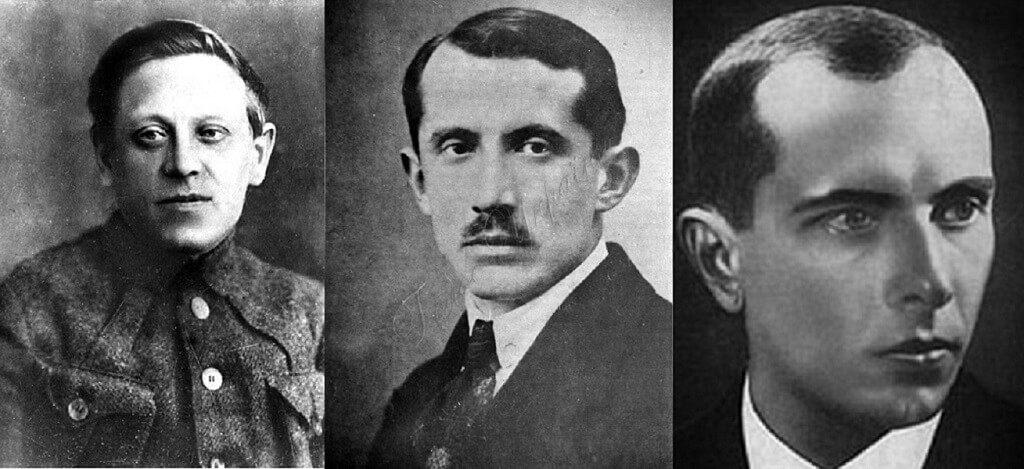Marco Levytsky, Western Bureau Chief.
May 23, 2018 marked 80 years since the assassination of one of Ukraine’s greatest statesmen, revolutionaries and military leaders – Col. Yevhen Konovalets. Struck down by the time-bomb of an NKVD agent, his body was discovered on the streets of Rotterdam, Netherlands, in 1938, almost 12 years to the day after the assassination of his close friend and comrade-in-arms, Symon Petliura.
May 23, 2018 also marked the first public statement by Yulia Skripal after she and her father, a former Russian agent, Sergei Skripal, were poisoned by a Russian nerve agent, Novichok, on March 4 in an assassination attempt perpetrated in Salisbury, England.
How are these two incidents connected? Very simply, they were both political assassinations, or attempts at assassination engineered by Soviet/Russian security agencies, who have undergone numerous name changes over the years, but whose ruthless terrorism has never changed.
When news of Russia’s involvement on the Skripal poisoning surfaced, it resulted in a diplomatic hurricane in which 28 countries and NATO expelled 150 Russian diplomats, after which Moscow kicked out 150 diplomats – all from the same countries that had initially expelled the Russia envoys and all matching exactly the number of Russians expelled from each respective country.
Comparisons were drawn between the attempted murder of the Skripals and other Russian assassinations and attempts.
Most prominent among them was the case of dissident Russian spy Alexander Litvinenko, who was killed in 2006 after someone slipped the highly radioactive polonium-210 into his tea. After fleeing Russia in 2000, Litvinenko became a fierce critic of President Vladimir Putin and Russia’s security service, the FSB. He also wrote a book accusing the FSB of being complicit in the 1999 apartment building bombings that Putin had blamed on Chechen rebels.
But it should be noted that many of the victims of Russian political assassinations and attempted ones have, like Konovalets, been Ukrainian nationalist leaders who sought freedom for their country.
Let’s begin with Konovalets’ predecessor Petliura, former Supreme Commander of the Ukrainian Army and the President of the Ukrainian Peoples’ Republic during Ukraine’s struggle for independence in 1917-1921, who directed the activities of the government in exile from Paris after the Soviet victory. On May 25, 1926, while walking on rue Racine, Petliura was shot five time by Sholom Schwartzbard, who claimed he was avenging more than 50,000 Jewish victims of pogroms, for which he blamed Petliura. That was and remains a false claim as it has been documented that Petliura actively sought to halt anti-Jewish violence on numerous occasions, introducing capital punishment for the crime of pogroming, but it was enough to get Schwartzbard acquitted by a French jury.
According to a defected KGB operative Peter Deriabin, however, Schwartzbard was a Soviet OGPU agent and acted on the order from a former chairman of the Soviet Ukrainian government and current Soviet Ambassador to France, Christian Rakovsky. This was a Soviet “wet act” and also served as a propaganda coup by tarring Ukrainian nationalists with the brush of anti-Semitism, a Russian disinformation campaign that remains active to this day.
Petliura was replaced by Konovalets as leader of the Ukrainian independence movement in exile who, in 1929, created the Organization of Ukrainian Nationalists (OUN). Konovalets’ activities raised fears in the Kremlin because of penetration of the OUN into the Soviet Union. On May 23, 1938, he was assassinated in Rotterdam by a bomb rigged to explode hidden inside a box of chocolates. This booby-trap was disguised as a present from a close friend. This friend, however, was in reality an NKVD agent who had infiltrated the OUN, Pavel Sudoplatov. On a recent visit to the Soviet Union, he had been personally ordered by Joseph Stalin to assassinate Konovalets.
Two more OUN leaders were assassinated in 1957 and 1959, Lev Rebet and Stepan Bandera, by the same person, KGB agent Bohdan Stashynsky, and by the same weapon — a spray gun that fired a jet of poison gas from a crushed cyanide capsule. The gas was designed to induce cardiac arrest, making the victim’s death look like a heart attack. Stashynsky used the weapon to kill Rebet, a journalist and one of the leading theorists advocating Ukrainian independence, in 1957. On October 15, 1959, he used an improved version of the same gas gun to assassinate Stepan Bandera, leader of the OUN faction named after him, in Munich. Stashynky defected to West Germany in 1961 where he confessed to the murders. Incidentally, these two assassinations caught the attention of James Bond’s creator, Ian Fleming who, in his last novel, “The Man With the Golden Gun”, had Bond use a similar weapon in an attempt to assassinate his chief, M, after being brainwashed by the Soviets.
One may also include the dioxin poisoning of Viktor Yushchenko by Ukrainian government agents working for Moscow. He survived but was never the same after that.
Kremlin-sanctioned political assassinations on foreign soil are not only commonplace, they are a regular feature of Russian diplomacy. And why have Ukrainian nationalists been victims of so many Moscow-ordered assassinations? Because an independent Ukraine remains the biggest threat to Russian imperialism. As former U.S. National Security Adviser Zbigniew Brzezinski once put it: “Without Ukraine, Russia ceases to be a Eurasian empire.”
And, as long as Russia maintains its imperial ambitions, it remains the biggest threat to world peace. But the biggest threat to Russian imperialist goals is an independent Ukraine. Once Moscow gives up its imperial ambitions, Russia may eventually develop into a civilized country. Which is why Ukrainian security remains such a critical element of global security.
Share on Social Media




































